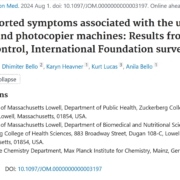Hans Ulrich Hill: Die Ursachen von Multisystemerkrankungen sind vielfältig und oft noch nicht vollständig geklärt. Häufige Ursachen sind eine Kombination aus genetischen Faktoren und Umweltfaktoren, wie Infektionen und Schadstoffen (z.B. Lösungsmitteln und diversen Schwermetall-Belastungen). Aber auch Fehlregulationen des Immunsystems spielen eine Rolle.
Von besonderer Bedeutung für die Auslösung der Multiplen Chemikalien-Sensitivität (MCS) und von neurodegenerativen Krankheiten wie Parkinson und Alzheimer sind hoch-toxische Umweltchemikalien wie Pestizide vom Typ der organischen Phosphatverbindungen, der Pyrethroide, aber auch Feinstaub, wie er bei Tonern/Emissionen aus Laserdruckern vorkommt.
nano-Control, Internationale Stiftung hat 4.000 Berichte von Betroffenen durch ultrafeine Partikel aus Laserdruckern und Kopierern erhalten. Sie zeigen ein sehr deutliches Bild.
Folgen von Langzeit-Expositionen: Entzündungen entstehen im gesamten Körper und das Immunsystem wird massiv gestört. Diese Menschen sind in den Innenräumen die Kanarienvögel unter uns.
Fazit: Expositionen gegenüber Umweltchemikalien vermeiden, soweit es möglich ist.
Dr. Hans-Ulrich Hill und Prof. Wolfgang Huber zeigen die Zusammenhänge zwischen Multipler Chemikalien-Sensitivität (MCS), einer Multisystemerkrankung und den neurodegenerativen Krankheiten, wie Alzheimer und Parkinson auf.
Originalversion in englischer Sprache
Hans-Ulrich, H., and Wolfgang, H., 2025.
Connections between Multiple Chemical Sensitivity (MCS) and Mechanisms of Neurodegenerative Diseases – Hints and References from Scientific Literature
European Society of Medicine. Medical Research Archives, [online] 13(5). 31 May 2025. doi.org/10.18103/mra.v13i5.6463 Weiterlesen
Hinweise und Belege aus der Fachliteratur


